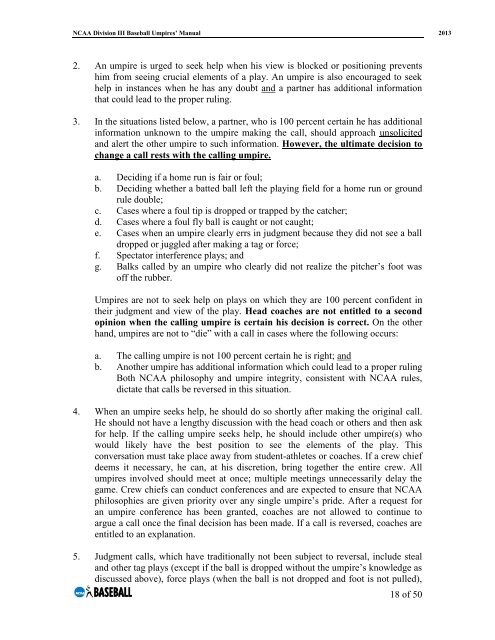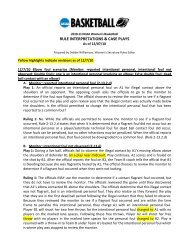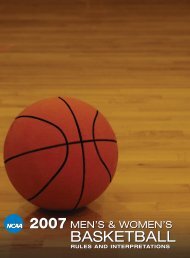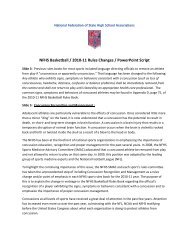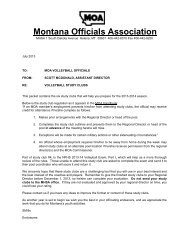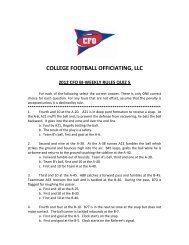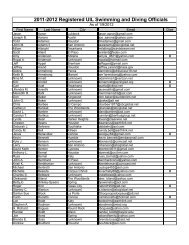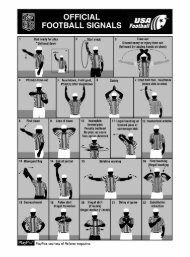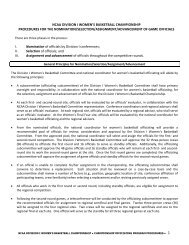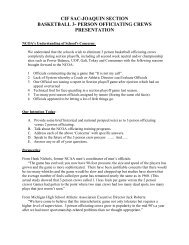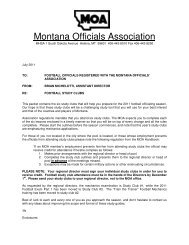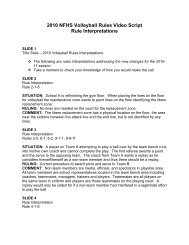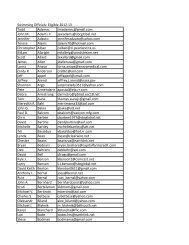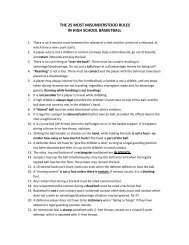manual - NCAA Baseball Central Hub - ArbiterSports
manual - NCAA Baseball Central Hub - ArbiterSports
manual - NCAA Baseball Central Hub - ArbiterSports
Create successful ePaper yourself
Turn your PDF publications into a flip-book with our unique Google optimized e-Paper software.
<strong>NCAA</strong> Division III <strong>Baseball</strong> Umpires‘ Manual 20132. An umpire is urged to seek help when his view is blocked or positioning preventshim from seeing crucial elements of a play. An umpire is also encouraged to seekhelp in instances when he has any doubt and a partner has additional informationthat could lead to the proper ruling.3. In the situations listed below, a partner, who is 100 percent certain he has additionalinformation unknown to the umpire making the call, should approach unsolicitedand alert the other umpire to such information. However, the ultimate decision tochange a call rests with the calling umpire.a. Deciding if a home run is fair or foul;b. Deciding whether a batted ball left the playing field for a home run or groundrule double;c. Cases where a foul tip is dropped or trapped by the catcher;d. Cases where a foul fly ball is caught or not caught;e. Cases when an umpire clearly errs in judgment because they did not see a balldropped or juggled after making a tag or force;f. Spectator interference plays; andg. Balks called by an umpire who clearly did not realize the pitcher’s foot wasoff the rubber.Umpires are not to seek help on plays on which they are 100 percent confident intheir judgment and view of the play. Head coaches are not entitled to a secondopinion when the calling umpire is certain his decision is correct. On the otherhand, umpires are not to ―die‖ with a call in cases where the following occurs:a. The calling umpire is not 100 percent certain he is right; andb. Another umpire has additional information which could lead to a proper rulingBoth <strong>NCAA</strong> philosophy and umpire integrity, consistent with <strong>NCAA</strong> rules,dictate that calls be reversed in this situation.4. When an umpire seeks help, he should do so shortly after making the original call.He should not have a lengthy discussion with the head coach or others and then askfor help. If the calling umpire seeks help, he should include other umpire(s) whowould likely have the best position to see the elements of the play. Thisconversation must take place away from student-athletes or coaches. If a crew chiefdeems it necessary, he can, at his discretion, bring together the entire crew. Allumpires involved should meet at once; multiple meetings unnecessarily delay thegame. Crew chiefs can conduct conferences and are expected to ensure that <strong>NCAA</strong>philosophies are given priority over any single umpire’s pride. After a request foran umpire conference has been granted, coaches are not allowed to continue toargue a call once the final decision has been made. If a call is reversed, coaches areentitled to an explanation.5. Judgment calls, which have traditionally not been subject to reversal, include stealand other tag plays (except if the ball is dropped without the umpire’s knowledge asdiscussed above), force plays (when the ball is not dropped and foot is not pulled),18 of 50


